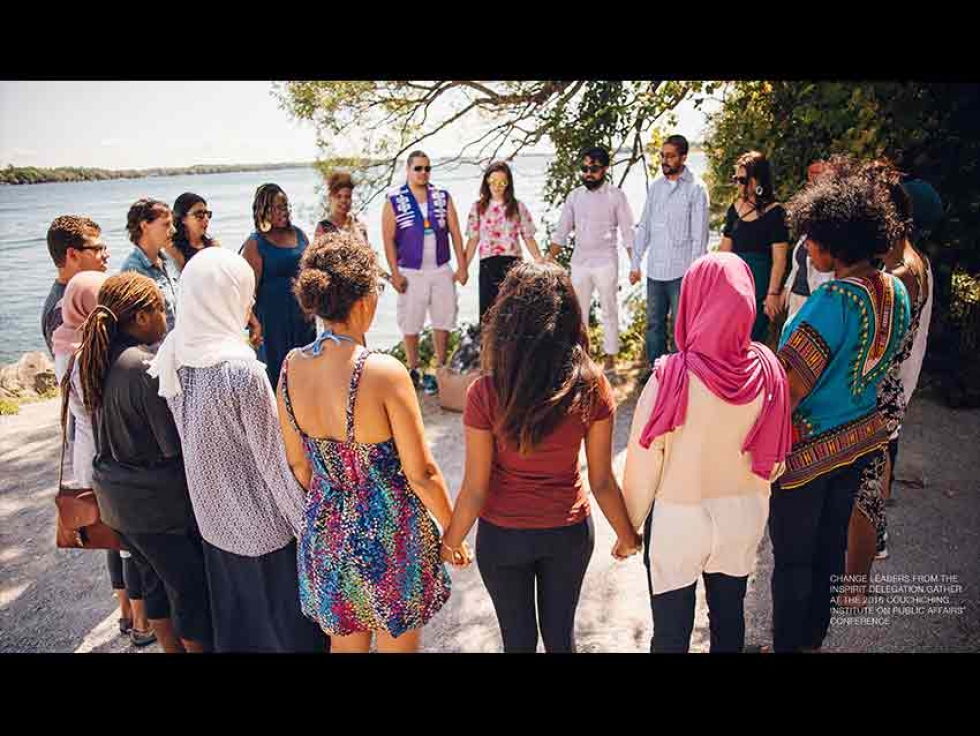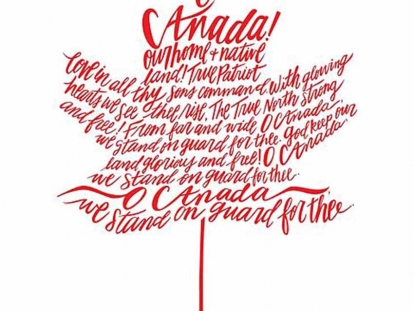 Change leaders from the Inspirit Foundation Delegation at the annual Couchiching Conference in 2016.
Inspirit Foundation 2016 Annual Report
Change leaders from the Inspirit Foundation Delegation at the annual Couchiching Conference in 2016.
Inspirit Foundation 2016 Annual Report
Jan
Our Home on Native Land: Indigenous Education in Islamic Schools
Written by Farrah MarfatiaHumility is a great teacher, if we let it do its work. As a community figure committed to equity and social justice, I strive to continuously learn and often, that means learning from my own mistakes, however embarrassing.
I was invited with a group of people to be a change leader with the Inspirit Foundation at the annual Couchiching Conference. The location was stunning and it was an honour to appear alongside my colleagues over a weekend of community spirit building. The conference wasn’t the only thing pregnant with possibility, I also went there expecting my third child, excited to be pushing for her better future as well.
After a day of conferencing, there was a moment that has stuck out in my mind: a humbling learning moment – one that reminded me that I didn’t know everything despite my best intentions and education and, actually, I still had a very, very long way to go.
One of the conference participants, an Indigenous friend, asked a group of us if we would participate in a smudging ceremony that he was performing with others on site. I immediately felt my gut tighten up.
What exactly is the ceremony?
Am I able to participate from an Islamic point of view?
Why don’t I already know this stuff?!
Ultimately, I declined, hiding behind my pregnancy but the incident jarred me. How can I have grown up in Canada, educated in a school system that claimed to prize multiculturalism and yet, be totally ignorant of the cultural practices and values of the First Peoples of this land?
Since then my knowledge level has drastically changed and it has got me thinking more and more about the responsibility of Islamic schools in particular and Muslims in general to be learning about Indigenous peoples, cultures and histories to fill the education gaps.
Muslim Canadians have an ethical obligation to come to terms with the fact that by being in Canada, they have entered into treaty relationships with the Indigenous peoples of this land. These relationships, for everyday folks, come with particular responsibilities including knowing the truth about the history of settler-indigenous relationships and working to incorporate acts of long-term reconciliation into their lives. This responsibility is even more important for Muslim educators. Understanding the truth and working towards reconciliation, particularly through education, are lifelong commitments. And yes, it can feel impossible knowing where to start but the point is to begin somewhere and to remain consistent in educating oneself.
But, why bother?
The easy answer for educators is that the 2018 revisions to the Ontario curriculum require it. The revisions demonstrate Ontario’s commitment to respond to the Truth and Reconciliation Commission’s (TRC) Calls to Action and were made in collaboration with Indigenous teachers, elders, knowledge keepers, senators, community representatives and residential school survivors. The goals of the revisions are:
- To focus on strengthening students’ knowledge and understanding
- To center Indigenous histories, cultures, perspectives, contributions and ways of knowing
- To teach the colonial history of residential schools, treaties and the Indian Act.
For readers who might not be familiar with the TRC, I want to provide a brief note about what it is and encourage you to make the time to read (at least) it’s Executive Summary. From 2007 to 2015, as part of the Indian Residential Schools Agreement, the Government of Canada set up the TRC as an opportunity for Indigenous peoples across Canada to testify and bear witness to the history and legacy of the Canadian Residential Schools system (the Truth). More than 6,500 witnesses were heard and included in a new record of the oppressive colonial system. The final report is a staggering six volumes documenting this terrible history and how it continues to affect the lives and relationships of Indigenous peoples to this day. Additionally, the report culminated in 94 Calls to Action for Canadians and bodies of all strides to follow in the move towards shared societal healing (reconciliation).
It is hard to put into words the pain and trauma endured by Indigenous children and their families as documented in this report: the tragedy of thousands of broken families, of cultural and physical genocide, of the transformation of this system into modern child welfare, and the lasting effects of intergenerational trauma on survivors and their descendents. Much more important and deeper than the fact that Indigenous education is in the curriculum is the moral responsibility we all hold in bearing witness to this history and understanding our contemporary social relationships from it.
As Muslims we are continuously encouraged throughout our faith tradition to seek knowledge, to think critically about the world around us, to challenge injustice and oppression every time it happens. At a systemic level, this means taking a keen eye to the country we call home and what foundations it has been built upon. It means moving beyond the self-proclaimed national traits of what it means to be Canadian (nice, apologetic, etc) and sitting with uncomfortable truths about ourselves – that ultimately the privileges we enjoy as Canadians come with a high cost to Indigenous peoples who continue to so graciously share this land with us. Shouldn’t we want to enjoy these things together? In a way that dignifies the histories, languages, cultures and ways of being for everyone here? As Tanya Talaga noted in her recent op-ed for The Star, “Most Indigenous leaders never use the word “reconciliation” because it is not plausible when First Peoples are still fighting for basic human rights — for water, land, social services, health care and education. The reality of 2019 looks a lot like Canada’s colonial past.” And that isn’t going to change until non-Indigenous Canadians, like us, take up this cause as we would our own.
Muslims are no strangers to experiencing the trauma of colonialism and reflecting on our similarities can build mutual understanding and empathy which must underlie every reconciled relationship. Virtually every Muslim country on earth from West Africa to the South Pacific has a history of having been colonized and knows the oppression that came with it. Some countries, like Palestine, continue to suffer under occupation. It seems when we arrive in a place like Canada and begin to build our lives and communities here we spend more time focusing on our own experiences (and with good reason – anti-Muslim hatred affects all of us) and forget that our presence could be actively contributing to Indigenous experiences of colonialism.
There are challenges to taking Indigenous education seriously, however, with confronting apathy being the primary obstacle. Muslim communities are not immune to the general indifference of Canadian society to the plight of missing and murdered Indigenous women and girls (MMIWG), suicide epidemics in Indigenous communities, learning about residential schools, or centering Indigenous histories and voices. And it isn’t as if this is something new: it’s a continued part of the coldness of a system that has been built on Indigenous marginalization. Even teachers with the absolute best of intentions lack the necessary knowledge to feel confident teaching Indigenous education – a deficiency that develops in the system that produces it. As educators and educational administrators who know that we want to do better on this issue, the task can feel daunting and no one wants to cheapen these necessary lessons by going over them superficially either.
So, how do you do it?
How can we ensure well-rounded Indigenous education in Islamic schools using the new curriculum changes as a framework?
Involve parents. Social change requires a collective paradigmatic shift and that starts in families and communities. Not only have studies shown that students do better when their parents are involved with their studies, it also encourages parents to expand their knowledge horizons. Parents are the primary educators of their children with respect to learning about values, appropriate behaviour, and cultural, spiritual and personal beliefs and traditions. They are their children’s first role models, thereby making their involvement in learning this subject crucial. Schools and parents must work together to ensure that home and school provide a mutually supportive framework for the education of our youth. A great example of direct parental involvement is organizing a Blanket Exercise – an incredible teaching tool for learning about the colonization of Turtle Island that I used when I was Principal.
Get informed and be patient. A task like this only seems daunting if we are in a hurry to check it off. If we are in it for the long term, we know that we will accumulate valuable lessons and resources a lot faster than we think, giving us the confidence to continuously tackle these subjects meaningfully and confidently. When you are looking for resources, try to ensure that Indigenous peoples are being portrayed fairly and, ideally, choose Indigenous authors, artists and textbook writers to lend their perspectives and stories of lived experiences authentically. Other helpful resources include: the Ministry of Education Ontario toolkit, the Assembly of First Nations toolkit, Good Minds, the Elementary Teacher Federation of Ontario, and Queens University’s curriculum resources.
Be active in engaging students. The curriculum should come alive in schools and classrooms, and should be animated by teachers using different tools, resources and strategies to do so. Don’t be afraid to try something different like a youth exchange or classroom exercises, being careful to avoid stereotyping or inappropriate uses of culture. We can teach students until we are blue in the face but if we figure out unique ways of engaging them, we are more likely to have a lasting impact on their knowledge and outlook.
Build relationships with Indigenous communities. Indigenous education does not need to be limited to the classroom. Firstly, there are Indigenous Muslims who may attend your schools who might be encouraged to share and showcase their culture, if desired. More than that, remember that your school is a community institution and can reach out to nearby First Nations to arrange informative field trips, Elder talks at the school (fairly compensated, of course), cultural days where you hire Indigenous dancers and artists to teach the students traditional dances and other elements, or see if residential school or Sixties Scoop survivors are doing talks in your area. Students are unlikely to forget such an experience. And if the FNIM (Engaging First Nation, Inuit and Métis Youth) communities near you need some help, a school-wide drive or campaign can help build bridges and friendships that last a lifetime.
We cannot change Canada’s horrifying past but as Muslims and educators we have a hand in influencing its future. Let’s do it right.













